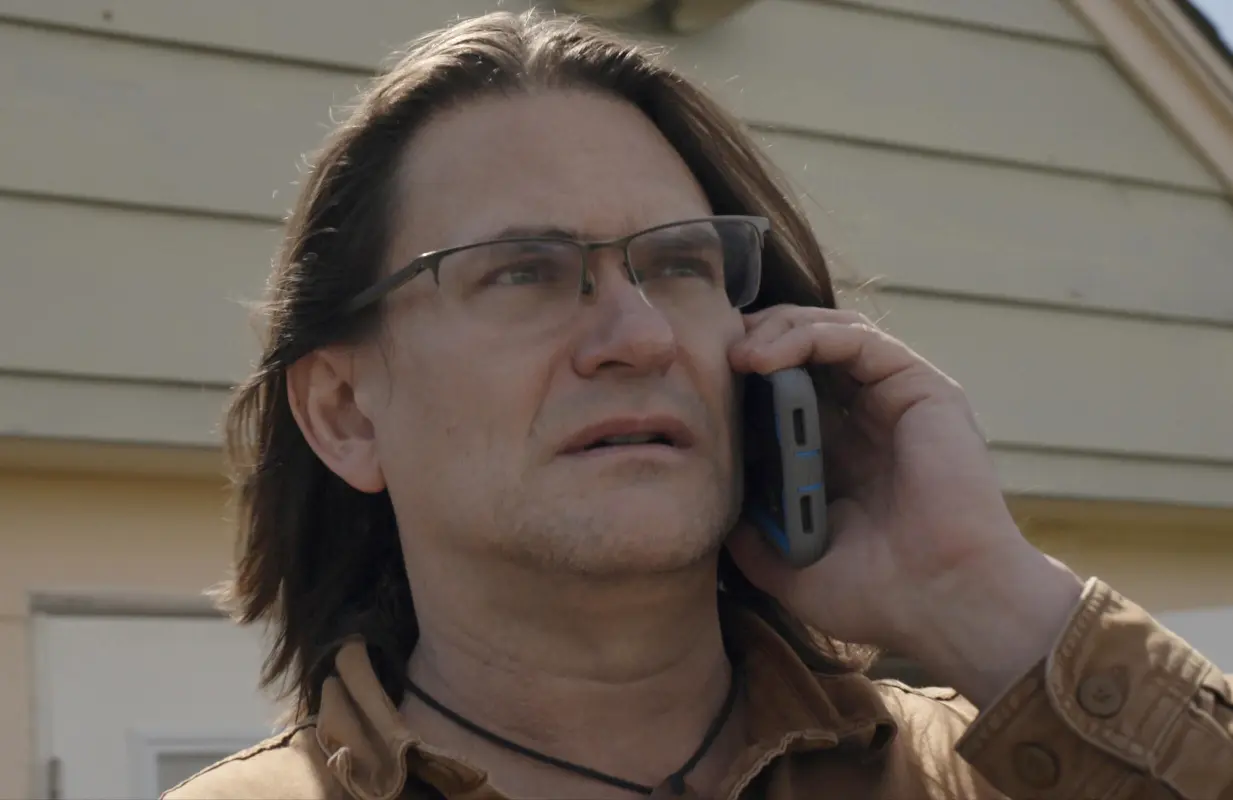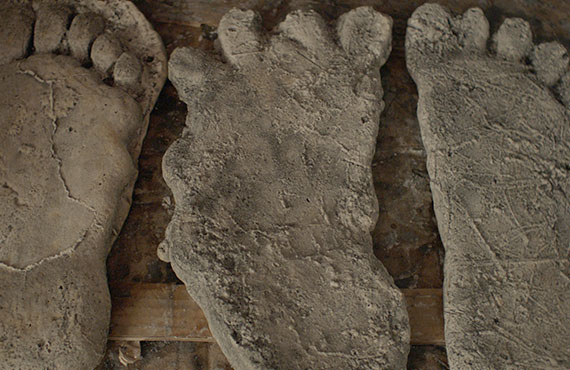Hulu's Sasquatch Investigates a Triple Murder Attributed to the Beast
-
 Sasquatch follows investigative journalist David Holthouse as he looks for answers in the unsolved case of a 25 year-old triple homicide. (Photo: Hulu)
Sasquatch follows investigative journalist David Holthouse as he looks for answers in the unsolved case of a 25 year-old triple homicide. (Photo: Hulu)The editor-in-chief of the daily newsletter Best Evidence, Sarah D. Bunting knows a thing or two about true crime. Her weekly column here on Primetimer is dedicated to all things true crime TV.
Hulu's docuseries Sasquatch isn't really about Sasquatch — or Bigfoot, or yetis, or any of the other cryptids said to lurk in mountain forests around the world. But the new three-part series from the Duplass Brothers (Wild Wild Country, The Lady and the Dale) isn't completely not about Sasquatch, either. Directed by Joshua Rofé (Lorena) and augmented by "re-enactments" featuring Kalakala Animation's vintagey work, Sasquatch uses the woodland legend and his (or their) believers to explore an unsolved murder in California's marijuana "Emerald Triangle" — and the various reasons humans make up monsters.
The story begins with David Holthouse, an investigative journalist who had a gig on a marijuana farm back in 1993, and remembers two "colleagues" returning from the site of a triple homicide, swearing that Sasquatch had done it. Holthouse, a reporter with a self-professed gift for going undercover amongst criminals, wondered for decades what really happened, and decides to get to the bottom of it.
A lot of how much you enjoy Sasquatch will depend on how appealing you find Holthouse's aging-rock-climber persona. If, like me, you read Outside magazine for the fantastic feature writing but would rather eat a bowl of glass than go camping, you'll like Holthouse fine — and never more than when he cuts a side-eye at the camera while a source is preparing to go full crackpot on the U.S. Navy's UFO cover-up. Holthouse and Sasquatch both have just the right attitude about Bigfoot, professional Bigfoot personalities like James "Bobo" Fay of TV's Finding Bigfoot, and "Sasquatch hunters and life partners" Wayne and Georges (whose hilarious squabble about whether Wayne thinks Sasquatches have cloaking devices "and all that other bullshit" is one of the most pleasingly goofy minutes of television you'll see all year). It's not that anyone involved in the production believes in cryptids, or that one of the hirsute beasts tore three people apart years ago. It's that Sasquatch is able to sift patiently through the crazy to get to the tiny flakes of information or truth in the tall tales.

If you have zero patience with Bigfoot-iana, the first episode may seem a bit too deliberately paced — and you may have similar issues with the second episode, which shifts focus from supernatural "extra-human" shenanigans to the extra-legal ones the region is famous for. Sasquatch's overview of the history of the Emerald Triangle, from the first Gold Rush settlers massacring indigenous people to the 1970s hippie incursion, is well done and informative, even if Netflix's 2018 six-parter on Humboldt County and the marijuana economy's evolution is recent enough to make Sasquatch's recap a bit redundant. Still, I'd stick with it; facts bubble up later on may make you wonder why they got buried where they did, or when the series is finally going to get back to the crime-solving you tuned in for — but that's part of Sasquatch's point. Sasquatch is a myth, and part of what makes that myth enduring is the tantalizing lack of hard evidence; one could say the same about the triple murder whose outlines Holthouse is squinting into the darkness to make out. The Emerald Triangle isn't a place that welcomes law enforcement and/or traditional rules. Murders go unreported and unsolved as a matter of course in the area, and always have. Like Bigfoot, the true nature of that triple murder will probably never be known — and like so many other horrific murders, humans have made up a monster to blame it on, the better to avert our eyes from the monsters in our own midst.
Sasquatch is quite a bit more matter-of-fact about those lofty figurative parallels than I've made it sound. Three episodes is relatively short by true-crime-series standards, and while you may find yourself second-screening at times, it's not slow and it doesn't mess around. Holthouse chases down leads with promptness, and when trails peter out, he doubles back or moves on just as promptly. The doc is interested in why we tell ourselves "ghost stories" like this one, and it's interested in the story itself — but when it gets to the end, or realizes there isn't an end, it... ends.
Sasquatch is very watchable and atmospheric, and it put me in mind of another property that understood why stories without ends, and crime puzzles without solutions, drive us — and drive us crazy. Jon Billman's The Cold Vanish: Seeking the Missing in North America’s Wildlands is, on the surface, about the people who go missing (or get killed) in national parks, but it's just as much about the people left behind, the ones still looking years later. Like Billman's book, Sasquatch is a well-told story with a true but messy non-ending. I recommend it.
All three episodes of Sasquatch drop on Hulu April 20th.
Sarah D. Bunting co-founded Television Without Pity, and her work has appeared in Glamour and New York, and on MSNBC, NPR's Monkey See blog, MLB.com, and Yahoo!. Find her at her true-crime newsletter, Best Evidence, and on TV podcasts Extra Hot Great and Again With This.
TOPICS: Sasquatch, Hulu, Joshua Rofé, The Duplass Brothers, True Crime
- Hulu's Sasquatch is a refreshing change of pace in the true-crime docuseries genre
- Hein’s Picks: It’s Oscar Time (But You’d Hardly Know It)
- Hulu's Sasquatch Doc Explores Whether Bigfoot Really Killed Three Guys on a Dope Farm
- Duplass Brothers' Hulu's Sasquatch docuseriess to tackle whether Bigfoot killed three guys at a dope farm